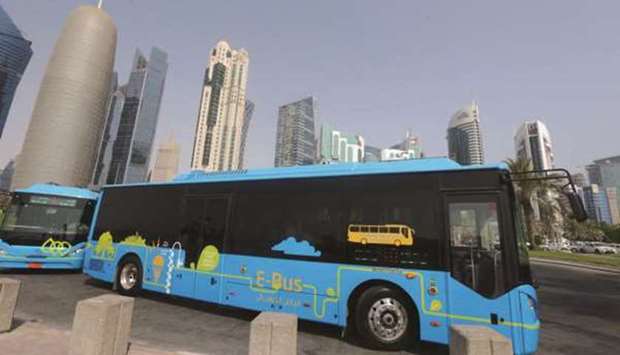Qatar is ramping up efforts in sustainable development, such as water and electricity conservation, which includes plans to convert the country’s public transportation to electric by 25% in 2022 and by 100% in 2030, the US-Qatar Business Council (USQBC) stated in a report.
The ‘Qatar Sustainability Report: A Leader in Green Initiatives’, released by the USQBC, includes important information on how Qatar is driving sustainability through its policy, global leadership, and how the country’s key projects adhere to the highest sustainability standards.
“Over the past decade, Qatar has managed to reduce the electricity and water consumption by about 20%. Qatar has been heavily investing in replacing its older power plants with new ones with better efficiency, state-art-technologies, and low emissions.
“By 2022, 25% of Qatar’s public transportation will be electric, and 100% will be electric by 2030,” the report stated, citing data from the Qatar Sustainability Fact Sheet by the Embassy of the State of Qatar in Washington DC.
According to the report, Qatar became a desalination pioneer in recent years to ensure sustainable access to fresh water for its residents as the State’s growing household water consumption adds stress to the economy, infrastructure, and the environment.
“New measures were proposed to curb the demand through increasing water tariffs and recycling domestic wastewater for semi-productive use. Currently, seawater desalination constitutes more than 60% of total water consumption in Qatar,” the report said.
Aside from water and electricity conservation, the report also highlighted the government’s key sustainability initiatives, such as those for the 2022 FIFA World Cup, solar power, Qatar Petroleum’s (QP) sustainability drive, partnership with NASA, and Qatar Sustainability Week.
The report said the Supreme Committee for Delivery & Legacy (SC) is on track to achieve its commitment to deliver the first-ever carbon neutral FIFA World Cup in 2022. It said the SC’s efforts in achieving carbon neutrality have resulted in two FIFA World Cup stadiums receiving top sustainability ratings this year.
Also, solar energy will contribute to powering the tournament as promised in the original bid. The Qatar General Electricity and Water Corporation (Kahramaa) is currently developing multiple projects including a largescale 800MW solar energy plant. After the tournament, the plant will continue to produce clean renewable energy for decades, leaving a significant legacy in carbon reduction, the report stated.
The report said QP launched its new ‘Sustainability Strategy’ this year, which establishes several targets in line with the goals of the Paris Agreement. This strategy sets a plan to reduce greenhouse gas emissions by 2030. It also mandates the deployment of Carbon Capture and Storage (CCS) facilities to capture more than 7Mtpa of CO2 in the country.
“The strategy sets a direction towards cutting down the emissions intensity of the country’s LNG facilities by 25% and of its upstream facilities by at least 15%, besides reducing flare intensity across upstream facilities by over 75% and eliminating routine flaring completely by 2030. The plan also includes restricting methane emissions along the gas value chain by creating a methane intensity target of .2% across all facilities by 2005,” said the report.
Qatar Foundation also partnered with NASA to find buried water in the earth’s deserts. In November 2020, Qatar Green Building Council hosted the fifth annual edition of Qatar Sustainability Week, an event showcasing innovative and practical solutions of various stakeholders to overcome environmental challenges. It also provided Qatar’s community to learn about how to adopt a more sustainable lifestyle, the report also said.


